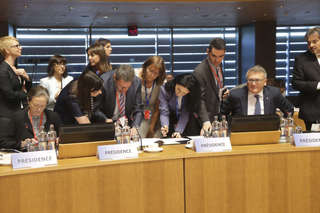 The European Union (EU) Ministers for Labour and Social Affairs met in Luxembourg on 16 July 2015 for an informal meeting on issues relating to employment, social affairs and equal opportunities. The first session on the social dimension of EU and the Economic and Monetary Union (EMU) governance, several weeks after the publication of the Five Presidents' Report on the deepening of the EMU, which also addressed the social component issue, was co-chaired by the Minister for Labour, Employment and the Social and Solidarity Economy, Nicolas Schmit, and the Minister for Social Security, Romain Schneider.
The European Union (EU) Ministers for Labour and Social Affairs met in Luxembourg on 16 July 2015 for an informal meeting on issues relating to employment, social affairs and equal opportunities. The first session on the social dimension of EU and the Economic and Monetary Union (EMU) governance, several weeks after the publication of the Five Presidents' Report on the deepening of the EMU, which also addressed the social component issue, was co-chaired by the Minister for Labour, Employment and the Social and Solidarity Economy, Nicolas Schmit, and the Minister for Social Security, Romain Schneider.
As an introduction to the press conference, Nicolas Schmit touched on the need to give greater visibility to the social component and to reinforce the management of social issues as part of governance at a time when Europe is going through a critical phase. "This shared European concern, especially at this time of recovery from a crisis, requires a specific response", the Minister pointed out, also emphasising the need to adopt an approach that is different from the one used previously. In this context, it will be necessary to find solutions to youth unemployment which remains a "plage in Europe", stated Nicolas Schmit.
Marianne Thyssen, European Commissioner for Employment, Social Affairs, Skills and Labour Mobility, pointed out that even though 1.5 million jobs had been created within the EU in 2014, the situation remained "tragic" given that 23 million Europeans, including 4 million young people, were still unemployed. Against this backdrop, the Commission will present a mobility package to promote worker mobility within the EU at the end of 2015, the Commissioner announced.
Romain Schneider, in turn, summarised the various interventions of the Member States, which had all agreed that the social dimension needed to become the focus of concern during subsequent stages of the Union integration process. In fact, the growth of unemployment and poverty within the EU pose a "threat to general well-being, social stability and economic development".
The discussion also focused on labour mobility, the fight against youth unemployment, and the inclusion of gender equality in all the Union policies, Romain Schneider indicated.
In matters of governance, the Ministers stated that the existing system could be modified to promote, in a balanced way, greater competitiveness, structural convergence and inclusive and sustainable growth, while guaranteeing social cohesion. Therefore, "adequate governance providing for a specific approach to employment and social policies" is essential, Romain Schneider stated, pointing out that social and employment issues are closely linked to the coordination of economic, financial and budgetary policies within the Union.
 To bring this to fruition, the horizontal social clause of the Treaty of Lisbon can be taken into consideration to a greater degree when applying governance and developing macro-economic adjustment programmes. Said clause stipulates that "in all its policies and actions, the Union will take into account demands linked to the promotion of a high level of employment, the guarantee of adequate social protection, the fight against social exclusion, and a high level of education, training and health protection". In addition, social imbalances will be prevented and corrected thanks to the consolidation of the existing framework, the Minister stated. A convergent advancement of the social system will foster better coordination and help prevent a race to the bottom.
To bring this to fruition, the horizontal social clause of the Treaty of Lisbon can be taken into consideration to a greater degree when applying governance and developing macro-economic adjustment programmes. Said clause stipulates that "in all its policies and actions, the Union will take into account demands linked to the promotion of a high level of employment, the guarantee of adequate social protection, the fight against social exclusion, and a high level of education, training and health protection". In addition, social imbalances will be prevented and corrected thanks to the consolidation of the existing framework, the Minister stated. A convergent advancement of the social system will foster better coordination and help prevent a race to the bottom.
In conclusion, the Member States mentioned that they had to use the Union's legal framework as a basis, while at the same time respecting the competencies of the individual Member States and their social system cultures and striving to establish a consensus. "The existing tools available to the Union will have to be deployed to advantage in order to implement sustainable social reform. This will make the EU more resilient to shocks, more efficient and more prosperous in the long term", the Ministers stated.

